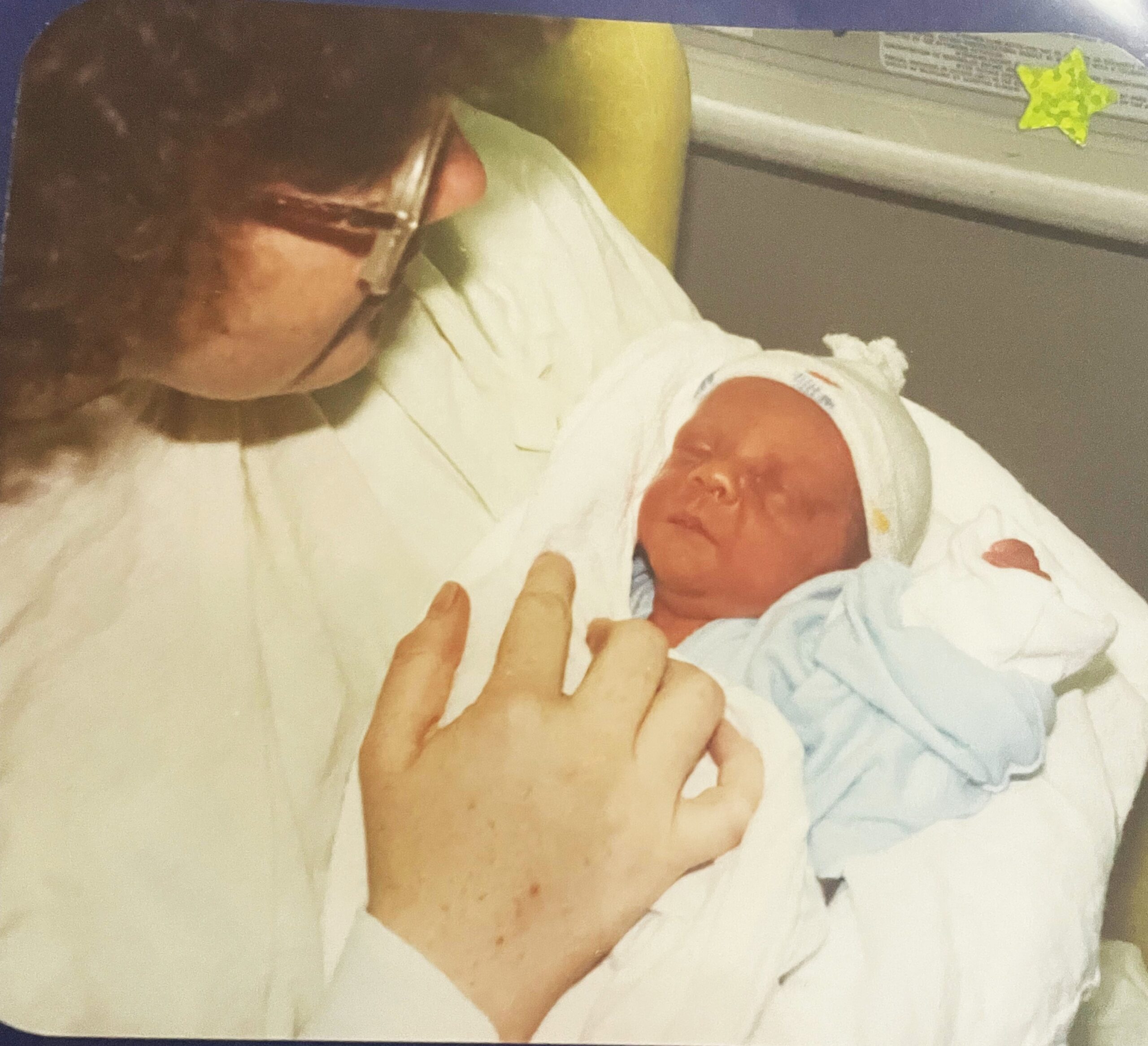I was terrified. Seven months pregnant, I was transported by ambulance to a hospital with a level 1 newborn intensive care unit. My husband arrived shortly thereafter.
It was clear our child would be born soon. I was on strong labor-inhibiting drugs, which have serious side effects. The plan was to give me the drugs for 24 hours while steroids gave our baby’s lungs a chance. I was semi-coherent and even mildly hallucinating.
I do recall an official looking person coming into the room with a clipboard. Did we want to enroll our premature, soon-to-be-born child in a clinical trial? Premature lung development can lead to infant respiratory distress syndrome. Our child could be randomized to one of two arms: receiving artificial surfactant, or no lung treatment. I looked at the person with glazed eyes. We agreed and my husband consented to the study.
Fortunately, our three-pound-fifteen-ounce son came out breathing, likely due to the steroids. He did not qualify for the study. Clinical trials led to approval of artificial surfactant to treat preemies with lung disease. I am grateful to those parents who agreed to allow their babies to be test subjects.
When caring for my parents, I enrolled in a randomized intervention study for caregivers at the University of Minnesota. Half the caregivers were given a significant amount of support, and the other half received no extra support. Fortunately, my lot fell to the trial arm receiving support. Periodically I met with a counselor who advised me on care for my aging parents. Rain, snow, or shine, I drove into the U of MN offices for my data collection sessions. (Now follow up is often virtual.) Compensation was free parking and a $10 bill for expenses. I still follow the U of MN Center for Healthy Aging and celebrate their continued research and public forums on caregiver support.
In my career I worked for eighteen years on the business side of clinical trials for blood and marrow transplant. I learned about the careful consideration put into the study design, consent forms, statistical analysis, and peer-reviewed publications. I have the deepest respect for the clinicians, statisticians, and others who carefully develop these studies. Data safety monitoring boards (DMSB) oversee their development and regularly review studies for safety.
The DSMB is the only entity allowed to see data during the trial. I saw how they cancelled clinical trials due to safety concerns, lack of progress, or no efficacy. I also saw studies enroll a thousand or more patients, making a difference in treatment plans. For example, a close relative developed multiple myeloma (MM), a lethal blood disease, in 2020. He is still alive, and I humbly marvel at my involvement in clinical trials that found ways to extend the life of MM patients.
At Clinical Trials.Gov you can find clinical trials for everything from cancer, to aging, to mental health. I in typed “caregiver burnout” and found 103 studies. The descriptions are interesting and make me curious about the conclusions reached.
Specific organizations offer information on how to participate in a clinical trial. For example, the Alzheimer’s Association has TrialMatch®, a service designed to match individuals with dementia, their caregivers, and healthy volunteers with applicable studies.
One more story on our experience with clinical trials. My husband has been on an expensive drug for a medical condition for about twelve years. When we went on Medicare our co-pay went from zero to $1,300 in the first month. Yes, our eyeballs nearly popped out. While we knew the cost would go down monthly, we had tough decisions to make. Fortunately, he was able to enroll in a clinical trial through his rheumatologist where he receives free drug for two years. The sponsoring pharmaceutical company provides a small amount of compensation for answering questions and receiving examinations by his doctor. The drug, approved by the FDA for a different condition, appears to be more effective than any of his previous medications.
Us “ordinary” individuals can play a part in research by engaging in clinical trials. They are not something to fear, instead we must recognize they play a crucial role in improving lives. Especially needed are people of minority ethnicities to participate in clinical trials. We can embrace this type of science, both for ourselves, and to help future patients. Do your own research, make informed decisions, ask questions, and seriously consider becoming a subject in a clinical trial.
Nancy R Poland, Grace’s Message
With grace and hope, Nancy Poland provides written and spoken communication on caregiving, loss, and other valuable topics. She owns what she calls a “micro-business” named “Grace’s Message,” however she has many years of experience in the business world.
In December 2022, Nancy retired from NMDP (previously National Marrow Donor Program/Be The Match) after nearly 28 years of employment. She most recently worked as a Contracts and Compliance Manager and spent over 18 years in management as a people-leader. Nancy has a Bachelor of Arts in social work and a Master of Arts in Health and Human Services Administration. She has authored two books on caregiving, issues a quarterly newsletter, and offers both in-person and virtual presentations.
A life-long resident of the Twin Cities in Minnesota, Nancy and her husband John raised two sons and continue to contribute to their communities, travel, and work on solving British detective shows.
As a working caregiver, Nancy encountered dilemmas such as the following, with no good choices.
- The phone rings, an ambulance is bringing her mom to the hospital (again). Does Nancy stay at work for the rest of the training session, or should she race to meet the ambulance and mom at the hospital?
- Dad is in the care home, in the later stages of dementia. The only day they schedule monthly family conferences is Thursday, no later than 2:30. Should Nancy take a half day off work, leave work and come back, or dial in, and miss out on a face-to-face conversation.
Working caregivers struggle with job obligations, caring for their loved one, and often other family responsibilities. The one they are caring for may be a child with special needs, an aging relative, or an unexpectedly injured spouse. None of us know when we will be called upon to care for another, and trying to balance each facet of life can be a recipe for disaster. When a caregiver has a crisis, it affects not only the ones involved, but also the company.
Studies show caregivers often have increased absenteeism or reduced performance while at work. They often need to cut down work hours or quit. As this is especially true for caregivers of older adults with significant care needs, for this talk I will focus on ways companies and caregivers can partner together to address the ever-increasing needs of caregivers for our aging population.
Website: https://nancyrpoland.com
Connect with Nancy Poland on social media:
Twitter (now X): https://twitter.com/nancypoland
Facebook: https://www.facebook.com/nancyrpoland
Linkedin: https://www.linkedin.com/in/nancy-poland-a4632632/
Instagram: https://www.instagram.com/nancypoland/




